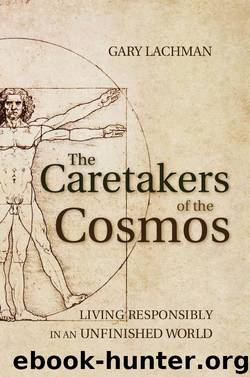The Caretakers of the Cosmos: Living Responsibly in an Unfinished World by Lachman Gary

Author:Lachman, Gary
Language: eng
Format: epub
ISBN: 9781782500223
Publisher: Floris Books
Published: 2013-08-21T16:00:00+00:00
The hierarchy of needs
Maslow disagreed with Sartre and argued that there is indeed a human nature, which we ignore at our peril. Maslow’s hierarchy of needs parallels Scheler’s hierarchy of values in some very key respects.10 One very important observation shared by Scheler and Maslow is that ‘higher’ needs or values do not appear until after ‘lower’ ones are satisfied. This is not to say that a higher need or value cannot take precedence over a lower one. This is the essence of any kind of self-disciple, and is behind the virtue of ‘delayed gratification’. In order to pursue the spiritual/cultural value of writing this book, I must put aside sensual values (eating and drinking too much), vital ones (going to a party with friends) and even other cultural ones (listening to music). If I am starving or dying of thirst, I can’t write at all, but once those values are satisfied, then the lure of the higher ones appears, or at least it can. People who remain at the pleasure level of the hierarchy of values, as well as those whose highest values are vital, aimed at social goods, seem inadequate, precisely because they have not moved on to a higher value, once the lower one has been achieved.
At the bottom of Maslow’s hierarchy are the basic needs for food, drink, and shelter. We all need to eat, we all need to drink, and we all need somewhere to sleep. These are the most primitive needs, shared by practically all living things; even plants need a bit of soil in which to grow. Above these needs is the need for security, for some emotional connection, for love, for some sense of belonging, for family of some kind. A starving man may not care about a roof over his head, but after he has been fed, the desire for some kind of home comes to him. Likewise, a homeless person may believe that all his problems would be over if he could only find a little perch somewhere, a small room he can call his own. But when that need is met, the desire for company, for a companion, arises, and he looks for someone to share his home.
If we meet these needs a new need arises, the need for self-esteem, the need for our worth to be recognised by others, by our friends, or workmates. My love need can be met by one other person or by a family, but my self-esteem need requires a larger group. So my workmates, the gang at the pub, the football team I play with on the weekend: these are the necessary sources of my self-esteem, my sense of worth, and I, in turn, serve the same function for them. Solitary types such as writers may receive self-esteem at a distance, from their readers and from reviews of their work (all too rarely, alas) but this is not quite the same as receiving it from others immediately around you. Sartre believed that most of us get our sense of ourselves, of who we are, from other people.
Download
This site does not store any files on its server. We only index and link to content provided by other sites. Please contact the content providers to delete copyright contents if any and email us, we'll remove relevant links or contents immediately.
Sapiens: A Brief History of Humankind by Yuval Noah Harari(14369)
Sapiens by Yuval Noah Harari(5366)
Pale Blue Dot by Carl Sagan(4996)
Homo Deus: A Brief History of Tomorrow by Yuval Noah Harari(4908)
Livewired by David Eagleman(3765)
Origin Story: A Big History of Everything by David Christian(3687)
Brief Answers to the Big Questions by Stephen Hawking(3430)
Inferior by Angela Saini(3311)
Origin Story by David Christian(3195)
Signature in the Cell: DNA and the Evidence for Intelligent Design by Stephen C. Meyer(3132)
The Gene: An Intimate History by Siddhartha Mukherjee(3094)
The Evolution of Beauty by Richard O. Prum(2993)
Aliens by Jim Al-Khalili(2827)
How The Mind Works by Steven Pinker(2813)
A Short History of Nearly Everything by Bryson Bill(2689)
Sex at Dawn: The Prehistoric Origins of Modern Sexuality by Ryan Christopher(2524)
From Bacteria to Bach and Back by Daniel C. Dennett(2481)
Endless Forms Most Beautiful by Sean B. Carroll(2474)
Who We Are and How We Got Here by David Reich(2431)
